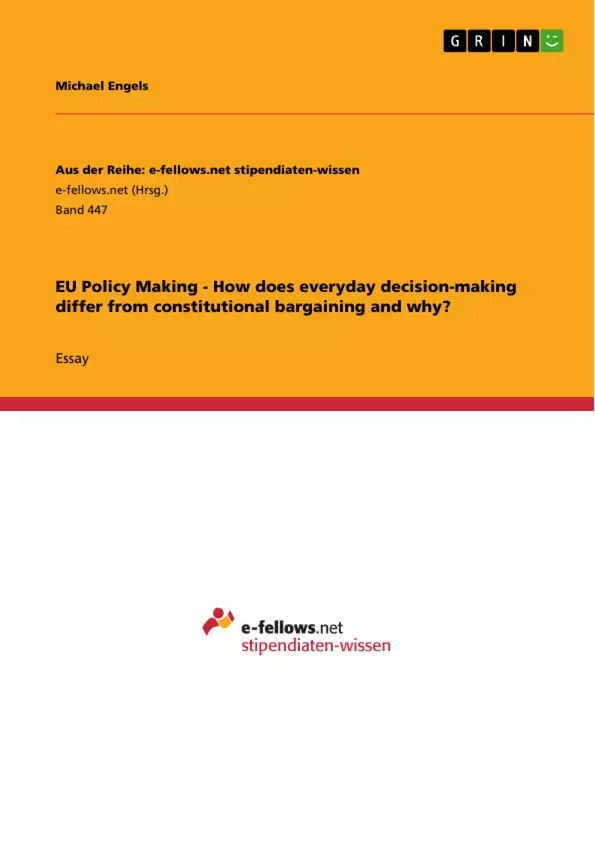This essay present a short theory developement integrating the prespectives of neo-functionalism and liberal-intergovernmentalism with regard to EU policy making.
Inhaltsverzeichnis (Table of Contents)
- Decision making process
- Analysis of decision making levels
- Meso-Level
- Systemic Level
- Super-Systemic Level
Zielsetzung und Themenschwerpunkte (Objectives and Key Themes)
This paper analyzes the decision-making process within the European Union, focusing on the differences between everyday decision-making and constitutional bargaining. It examines the EU as a "new governance system" characterized by multiple actors and levels of decision-making.
- Analyzing the EU decision-making process as a "new governance system"
- Identifying and comparing different levels of decision-making within the EU
- Exploring the role of informal networks and lobbying in the decision-making process
- Examining the theoretical frameworks that explain decision-making on different levels
- Understanding the influence of national interests and historical decisions on the EU policy process
Zusammenfassung der Kapitel (Chapter Summaries)
The paper begins by defining the EU's decision-making process as a complex, multi-layered system involving various actors and levels of decision-making. It then introduces a three-step approach to analyze this process: an examination of the nature of the decision-making process, an explanation of different decision levels, and a general interpretation.
The first chapter focuses on the decision-making process within the EU, highlighting its multi-layered nature, time sensitivity, and the involvement of both state and non-state actors. It proposes a pyramidal model with three levels of decision-making: the super-systemic level (grand-bargains, new treaties), the systemic level (policy making within the regulated EU framework), and the meso-level (informal policy making).
The second chapter analyzes each level of decision-making in detail. The meso-level is characterized by informal networks and technocracy, where opinions are shaped before reaching a formal stage. The systemic level involves formalized decision processes, constrained by previously agreed rules and the partial autonomy of institutional actors. The super-systemic level entails constitutional bargaining and decision-making through inter-governmental conferences.
Schlüsselwörter (Keywords)
The primary keywords and focus topics of this text include European Union decision-making, new governance system, multi-level governance, policy networks, constitutional bargaining, systemic level, meso-level, super-systemic level, institutionalism, rational choice theory, and lobbying.
Frequently Asked Questions
What are the three levels of EU decision-making described in the essay?
The three levels are the super-systemic level (constitutional bargaining), the systemic level (formal policy making), and the meso-level (informal networks and technocracy).
How does "constitutional bargaining" differ from everyday policy making?
Constitutional bargaining (super-systemic) involves grand bargains and new treaties between member states, while everyday policy making (systemic) occurs within existing regulated frameworks.
What role do informal networks play at the meso-level?
At the meso-level, informal networks and technocrats shape opinions and prepare decisions before they even reach the formal legislative stage.
Which theoretical perspectives are integrated in this analysis?
The essay integrates perspectives from neo-functionalism and liberal-intergovernmentalism to explain EU policy making.
Why is the EU considered a "new governance system"?
Because it is characterized by multi-level governance involving a complex mix of state actors, non-state actors, and supranational institutions.
What is the impact of national interests on systemic decision-making?
National interests remain influential but are often constrained by previously agreed rules and the partial autonomy of EU institutions like the Commission.
- Quote paper
- Michael Engels (Author), 2011, EU Policy Making - How does everyday decision-making differ from constitutional bargaining and why?, Munich, GRIN Verlag, https://www.grin.com/document/195316



